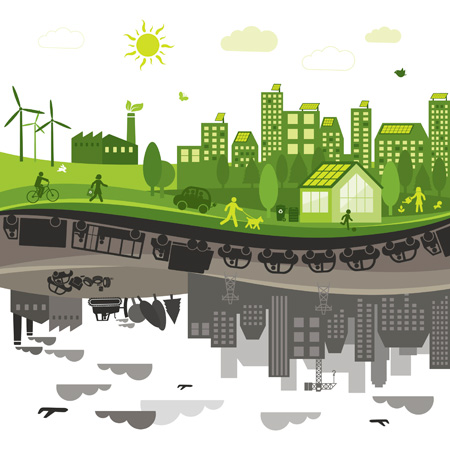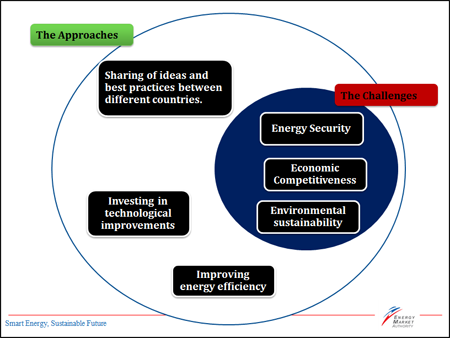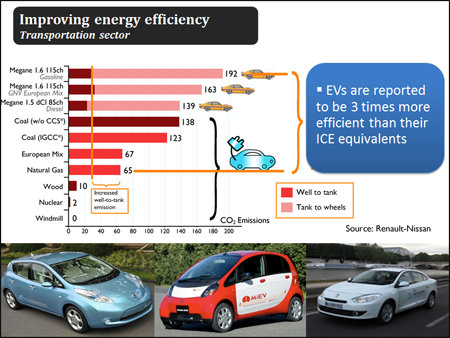
(Photo credit: iStockphotos.com)
But even as policymakers worldwide are cognisant of these challenges, they still grapple with what they call the "energy trilemma". How do governments across the globe ensure secure supplies of energy that are competitively-priced and affordable, and which do not impact the environment in the long term.
There is no single solution to meet their needs. Due to differences in size, geographical location and resource endowments, each country's fuel mix varies significantly. Some economies are blessed with access to hydropower and geothermal energy, while others have little to no alternative options to fossil fuels.
Take Germany. At present, coal and nuclear are the key constituents in its fuel mix, but the country is slowly phasing out nuclear energy over fears of a nuclear disaster similar to Fukushima's reactor meltdown last year. Gas, renewables and other solid fuels are expected to replace the share of nuclear in Germany's energy mix by 2025. This will slow down its undertaking to meet emission targets and require more government subsidies to encourage uptake of renewable energy.
For Indonesia, energy demand has been steadily increasing in line with an expanding middle-income class. Coal and gas are a main components of its energy mix. However, having indigenous coal means the archipelago has access to an affordable fuel, but it also has to manage the environmental costs of burning coal.
Energy efficiency as an alternative fuel
As an alternative-energy disadvantaged economy with no indigenous resources, energy efficiency features highly in our portfolio of energy strategies.

Energy efficiency is best summarised as a means to get more "bang out of your buck": It reduces energy use and costs while increasing its mileage. The concept of energy efficiency and sustainability can apply to even the smallest tasks in one’s daily life, such as making your smartphone battery last longer.
To encourage energy efficiency improvements in the household sector, Singapore continues to improve on current energy performance standards while encouraging innovation for new best practices.
Since 2011, all household appliances imported into Singapore have had to comply with minimum energy performance standards. They are also required to have labels that educate consumers on the importance of energy efficiency and the potential benefits of using more energy-efficient products.
This is also supported by EMA's approach of pricing energy correctly and avoiding subsidies, so that households and businesses do not waste energy. Low-income households that require help with their bills can get targeted rebates through the Utilities-Save scheme.
As the industrial sector is the largest energy consumer in Singapore, they have also been targeted in national efforts to better manage energy usage. From 2013, large consumers of energy will be required to, among other things, develop and submit plans to improve their energy efficiency.
On the innovation front, clean mobility technologies such as an Electric Vehicle Test-bed, are being trialed. EMA launched its electric vehicle (EVs) project last year with various partners, and currently there are 25 EVs on the road. EVs are potentially three times more energy-efficient than gasoline cars.

The EMA is also spearheading a pilot project for an Intelligent Energy System (IES) that tests a range of smart grid technologies aimed towards, among other things, shaving peak loads and reducing energy wastage. As part of the pilot scheme later this year, selected households will get meters and in-home displays that will allowthem to be more aware of their electricity usage.
In the suburb of Punggol, an Eco-Town is also taking shape. Solar panels are being installed in 45 public housing blocks to generate energy and test if solar energy can be integrated into the urban landscape. The energy generated will be used to operate lifts, corridor and staircase lights, and water pumps.
EMA believes in working with different stakeholders--including youth--to seek out best practices and exchange ideas in energy efficiency, and to invest in technological innovations towards sustainable development. These initiatives form part of Singapore's continued commitment to ensuring an equitable, prosperous and inclusive future for generations to come.
Extracted from a speech made by the Energy Market Authority (EMA)'s Chief Executive Chee Hong Tat, to audiences at this year's Asian Youth Energy Summit.
BY: Energy Market Authority